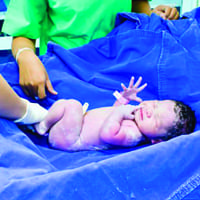Hour 1
The throes of labor have just ended and you see baby for the first time… well, you get glimpses of baby as he is having his first multitasking life experience. Hopefully, baby was lifted as he was born and placed on your bare chest while you’re delivering the placenta. Skin-to-skin contact at birth is best. Even if you’ve had a cesarean you can request to have baby placed skin to skin as soon as you leave the operating room if all is going well.
Your healthcare team will make sure he’s breathing OK, suction his nose and mouth of any mucous or amniotic fluid, dry him with towels, and make sure he’s healthy and well. Marvel as they check his vital signs and give him an antibiotic eye ointment to prevent any infection from exposure to bacteria he may have encountered in the birth canal.
Baby also gets his first shot—vitamin K to help his blood clot, just in case, as his own vitamin K won’t be ready until he’s about a week old. Baby is in the “quiet alert” stage now—the perfect time to start breastfeeding, if you haven’t done so yet.
If, however, baby needs a bit longer to get used to breathing on his own or stabilizing his body temperature, he may need to go to the NICU for a little extra help. Depending on how long baby may be in the NICU you can rest and start pumping breastmilk.


Hours 2-3
Once you’ve spent that first golden hour with your baby, your nurses will want to check his vital signs and look him over good from head to toe. Yes, it’s time to count fingers and toes, measure his head, chest, length and gather other vital facts. Your nurse will also want to know if baby has had his first poop. Important stuff!


Hours 4-24
Before baby gets to leave the hospital, his pediatrician will drop by. You’ll learn how to care for baby’s umbilical cord stump until it falls off and be asked how breastfeeding is going. You may also be offered a newborn hearing evaluation—this is an important screen.
Ironically, just as you and your family and friends are all ready to meet baby and see his beautiful eyes… he’s sleeping. The majority of baby’s first 24 hours will be a sleepy time for him, and they should be for you, too. You both just experienced one of the most physically demanding experiences in life and you need to recover. Fortunately, watching baby sleep is as amazing as watching him awake. Enjoy every minute!






Comments are closed.